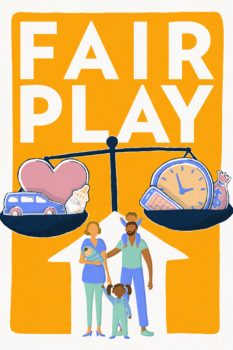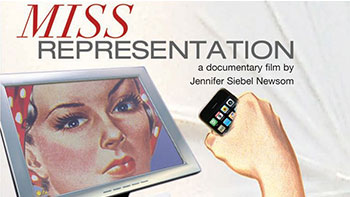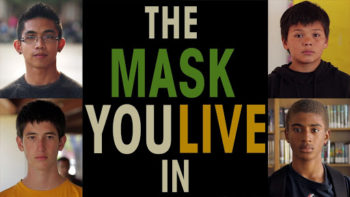Guest blog by Melissa Atkins Wardy
The number one gift a mother can give her daughter is a positive self-image in the face of rampant cultural stereotypes and media sexualization. – Melissa Atkins Wardy
When Jennifer Siebel Newsom agreed to write the foreward for my book Redefining Girly: How Parents Can Fight the Stereotyping and Sexualizing of Girlhood, Birth to Tween I was elated. Like me, she is a mother to young children who is passionate about ramping up the conversations around media, marketing, media literacy and how all of it affects men, women, and children. Raising a family today means being aware of and active towards these issues, but sometimes that ideal is not always met with people who are able to see what you see. Even if you are not a parent, I believe this information is critical because we are all surrounded with and impacted by media.
I frequently say to my Pigtail Pals & Ballcap Buddies Community that ‘once you see it, you can’t unsee it’. What I have found during the past five years of leading my community is that having an understanding and awareness of media literacy is one thing, knowing how to put that knowledge into practice while parenting is another. Last week as Imran Siddiquee and I were planning our Google hangout we were talking about how I wanted my book to be a road map for families who were aware of the issues the media presents and now wanted to know what to do about it. We also wanted to acknowledge Mother’s Day and discuss what a critical role mothers (and ‘other mothers’) play in teaching this awareness to their children, specifically their daughters. I want families and educators to start early and have this information available not only when their girls are fourteen, but when they are four. I want an empowered, healthy girlhood to be the benchmark these girls grow with as they become young women.
I’ve been a supporter, fan, and member of the Miss Representation community for a long time and it is an honor to kick off the Redefining Girly Blog Tour with a community of such intelligent and thoughtful people. You can watch the discussion between Imran and me by going here, and below are answers to the questions we ran out of time to answer. I hope you’ll pick up a copy of Redefining Girly for yourself or gift a copy to a parent or a school that would benefit from the information.
What does “Redefining Girly” mean? What is it that needs to be redefined?
Redefining Girly means that we need to broaden the gender boxes we place our children in and allow our girls the space to show us who they want to be in the world. There are many ways to be a girl. Not all girls are going to love pink, princesses, fashion and sparkles yet this seems to be the default for girlhood. Those things are fine, as long as there is some balance and girls are not limited to those things. Some girls are not going to like stereotypical ‘girly’ things at all; others will have some interest in them in combination with many other things that capture their imaginations.
Girls are just as diverse as any other group of people so with the call to Redefine Girly I am asking people to question and challenge the gender stereotypes sold to and surrounding our girls. I am asking that we look at girls as unique, talented people instead of foregone conclusions based on outdated gender stereotypes. I know that girls are smart, daring, and adventurous.
Viewer Lisa asks, “Let me be the first to ask an obvious one: how would you define ‘girly?”
I think this is a very important question with a very simple answer: Anything a girl is doing or interested in is girly. Science and sports are just as girly as ballet slippers and fancy dresses. There is no wrong or right way to be a girl. When my daughter is kayaking across the lake or making yet another mud pit in our backyard she is being just as girly as when she is playing dolls or drawing or playing Legos.
Overall, I don’t like the practice of assigning a gender to an activity or object. There are cultural norms around what ‘girly’ means, but culture is a fluid thing and girls have the right to be whoever they want to be in this world. We have to be willing to shift our definition to match what the girls before us are proving with their thoughts, actions, and accomplishments.
Viewer Jen asked, “How do we teach equality of sexes to the older generation?”
It can certainly be difficult to change old thought patterns, and gender stereotypes are so ingrained in our culture I think this is an issue for all generations, not just older folks. In Redefining Girly I advise people to speak their truth and in so doing you teach a new way of thinking. I would no more accept a racist comment made in front of my children than I would a sexist one, so while I don’t see it as my job to go out and change people’s minds I will certainly challenge any statements that attempt to limit my children due to their gender.
How can you be a “mother” and still teach your daughter that there isn’t a gender binary? Is the role of mothers any different than fathers – or men who are parents?
Gender equality is not about erasing gender or blending the sexes into a unisex world. It is about both sexes being equal and the spectrum of gender being inclusive and accepted. When I expose my children to this in daily teachable moments and leading by example they grow up in a home where they are being raised by a man and a woman but the binary is not in place. I spend a lot of time with my kids because I work from home so just by the nature of who I am they see me debunking the idea of a gender binary. They also see my husband share the work load of parenting and home ownership. Challenging the gender binary and leading by example is something both moms and dads can do and do well, so in that regard I do not think the role of mothers is different from that of fathers.
I love being a woman, a mom and my children know that I love them fiercely. I can proudly be a mom to them while still being my own person and enjoying my diverse interests. I love a Sunday at the ballet just as much as I do a Sunday drinking beer and watching football. My kids see their mom being an interesting, well rounded person and they grow up learning nothing is “for boys” or “for girls”, rather life is “for people”. Most men and women do not have interests or talents that align completely with the gender binary.
As a mother I can show my daughter the kind of woman I want her to be. My husband can pay other women and girls the respect he wants his daughter growing up to expect from the world. Ditto for our son.
How much can parents really do in the face of such negative media messages?
Sometimes it feels like maybe this is all too much and we’re trying to bail out a cruise ship with a tea spoon. But I think parents can have a really big influence and that is where I focused all of my energy with Redefining Girly. We can start by creating a home with diverse toys, responsible media, and an atmosphere that does not tolerate gender stereotypes and sexualization/objectification. We can teach media literacy at very early ages and we begin this by teaching critical thinking skills early. Ask questions about the media the kids are taking in, call out bogus advertisements, challenge a story line or the gender imbalance in a show’s cast, ask where the girls are and why they are not the heroes.
We can use our voice against violence and demoralizing media. We can model a healthy body image and respect the bodies of others. We can teach consent and healthy sexuality. We can use our consumer power to communicate to media content creators when something crosses the line (and when something is really good!).
An important concept from my book is parents giving their children a “personal brand”. Marketers are going to spend billions trying to brand your daughter, so I say why not beat them to it. Develop with her a sense very early on of who she is, what she stands for, and where she wants to go. When my daughter was little, like four years old, her personal brand was a “science-brained girl”. She is now eight and her understanding of herself has grown with her over the years, but she knows her worth and does a great job of calling out media that is trying to sell her short. Her personal brand is her core and anything she encounters that doesn’t jive with that bounces off of her as she stays true to herself. I hope she stays that way forever.
Viewer Shira asked, “What happens when we have little girls who buy-into the limiting stereotypes?”
We have a lot of little girls like that, unfortunately. Big girls, too. And we need to remember that they were not born with these stereotypes, they were learned and they can be unlearned. We can challenge the stereotype without challenging the girl and encourage her to be more, to see herself as more. We can offer experiences and provide examples that don’t align with the stereotype. We can very closely watch their media diet and make sure that what they are watching or listening to reinforces positive messages and not negative ones.
When girls don’t learn how to challenge these stereotypes they can be less likely to take on challenges, athletic opportunities, and see themselves as less intelligent than they really are. As teens they are prone to poor school performance, they drop out of sports, hold a negative body image, be less likely to practice safe sex and have sex at younger ages, develop unhealthy eating habits and even full blown eating disorders, abuse alcohol and drugs, and develop anxiety and depression.
Little girls are not the problem, stereotypes and sexualization are. It is our job as their older sisters, mothers, aunties, and village of women around them to take the real problem head on and say, so that our girls can hear you, “I do not accept this for my girls.”
Viewer Shira asked, “How do little girls pick up behaviors from their communities? How can we teach girls to feel confident in their voices?”
We all learn about gender and pick up behaviors from society. This is why it is so important for parents to provide their children with positive places and community members. Children learn by watching and by absorbing the energies and emotions around them. You want your daughter to have a positive body image? Don’t sit and watch the celeb body bashing during Oscar night or sit around with your sisters by the pool and talk poorly about your bodies. You want your daughter to feel confident in her body’s abilities? Play with her at the park or basketball court and show her how to take risks and see how far she can go with her muscles. You want your daughter to see herself as capable and competent in math? Let her help you do the taxes or bills or investment planning.
We can teach girls to feel confident in their voices when they see us using ours. Speak your truth. Stand up for other girls and women. Act with sisterhood and respect the voices of other females. Encourage her to write or act or create art that represents her voice. Using your voice is like strengthening a muscle and it only gets stronger with frequent use.
Viewer W. Miller asked, “How to talk to another adult woman who uses “pussy” and “girl” and “wuss” as derogatory terms applied to little boy’s behavior? Nephew has a female Kung Fu teacher he looks up to but she does that and I don’t know how to talk to her about it.”
Well, point blank she is teaching your son to be a misogynist. She doesn’t sound like a very encouraging or inspiring teacher. Being female is not a disease and our bodies, or pieces of our bodies, are not garbage. Being a girl is not an insult. But that is exactly what she is teaching your nephew and all the other children who can hear her. Your response will depend on your personality. If it were me, I’d have words with her in her office out of ear shot from the kids and tell her pointedly her comments are inappropriate, damaging and if they do not stop immediately my son will be leaving class and I’ll be taking my money to a different martial arts school. A good teacher never insults her students.
She may have never been taught to question what she is saying, but it is odd she is using gendered slurs that represent her. You could approach her and gently point out that she is teaching the boys to think less of girls, she is insulting the boys rather than building them up, and she is teaching girls not to think very highly of themselves. You could suggest other things she could say in those moments that actually accomplish teaching such as, “Follow through!” or “Maintain focus”, instead of you know, “Hit harder you pussy!”
Honestly, I find it really sad that she is still in business. I’d be reporting her license and writing an OpEd to the paper.
Anonymous asked, “What do you think of representations of little girls in main stream media like the Ellen Degeneres show?”
I don’t watch Ellen but just from what I’ve caught online it seems her producers book her girl guests that uphold the cultural stereotypes of what “girly” is. I’d love to sit down and chat with Ellen about Redefining Girly and then march out a tribe of little girls that show the audience there are many ways to be a girl.
Viewer Nancy asked, “I have three children. Two boys (ages 8 & 5) and one girl (2). One of the biggest irritants I face is people telling my boys they are “going to need to protect their sister from all the boys that are going to be chasing her”. Any advice on how to handle this?”
Simply reaffirm the message that YOU want them to have. Whether it be, “They all do a wonderful job of caring for and looking out for each other” or “We are raising Abby to take care of herself and be independent. I’m sure her brothers will always love and support her.” Kind of play the politician debate game: deliver your message and ignore the original question/remark.



